- Home
- Jack Campbell
Valiant tlf-4 Page 5
Valiant tlf-4 Read online
Page 5
Turning back to Rione, Geary addressed her. “Does what Lieutenant Iger said make sense to you?”
“As a civilian?” she asked sardonically.
“Yes.” More importantly, as a civilian after a century of war. Geary’s last experience with other civilians had been almost one hundred years ago, before the war with the Syndicate Worlds began. He’d seen what a century of war had done to the officers and sailors of the fleet, and wondered how it had changed civilians.
Rione gazed at him, seeming to guess the reasons for his question. “Certainly. As much as they’d like their military forces to triumph, as much as they’ve grown to hate the enemy, civilians are still not prepared to stand up to battle. Even if some individuals in those crews were ready to resist, they would have been carried away by the mass of their fellows who only wanted to avoid dying.” Rione caught the expression on Desjani’s face. “They’re not cowards,” she added in a very cold voice. “Someone who isn’t trained or mentally toughened for combat isn’t going to stand and fight the way military fighting forces are. They’re surely smart enough to know they don’t stand a chance against us.”
Desjani shrugged, her eyes on Geary. “Neither do those Syndic warships heading to intercept this fleet.”
But Geary shook his head at her. “Staying with those ships when they lack any combat training or capability wouldn’t accomplish anything. You or I would at least ensure they weren’t captured intact if we had any suspicion the enemy intended doing that, but dying to no purpose wouldn’t serve our cause.” He jerked his chin toward the display, which showed the two Syndic battleships charging toward them, still hours away from contact. “The Syndic commander is throwing away those ships and crews because he or she can, because those crews will follow senseless orders, even though it’s a total waste. May the living stars help me if I ever decide to waste lives like that just because I can.”
Desjani frowned slightly, her eyes averted as she thought. It had to be a difficult concept for someone raised and trained to believe that honor demanded fighting to the death. For someone who already knew she would do that if necessary. But then she had made that commitment before joining the fleet and lived with it since then. “Yes, sir,” she responded eventually. “I see your point. We expect obedience from those under us, and in return they deserve respect for their willingness to follow orders to the death.”
“Exactly.” She’d actually said it better than he had. He remembered Desjani once telling him that she’d been offered a job at her uncle’s literary agency before she joined the fleet, and once again wondered what Desjani would have been like if she hadn’t been born and brought up amidst a war already ancient to the Alliance.
Rione spoke again, her tone genuinely curious. “There’s something I don’t understand here. You watched the crews of the crippled Syndic warships we’ve already overrun hastily abandoning their own ships, yet didn’t seem to find it dishonorable the way you did the civilians fleeing their ships. Why?”
Desjani grimaced but didn’t turn or answer, so Geary did. “Because the warship crews waited until the last minute to abandon ship,” he explained.
Co-President Rione eyed him for a moment as if judging his seriousness. “Even though the action was inevitable, the fact that they waited made it better than if they’d left as soon as it was certain they couldn’t escape our pursuit. That makes it all right?”
“Well … yeah.” Geary looked toward Desjani, but she didn’t seem interested in helping explain anything to Victoria Rione. “Something might happen. Something unexpected. Maybe we’ll veer off. Maybe some big Syndic force will appear behind us at the jump point or come in through the hypernet gate again and cause us to run. Maybe the ships headed for them in particular will have something happen and drop their pursuit. Maybe they’ll get another weapon working and be able to put up a decent fight. Maybe a lot of things. So you wait as long as possible, just in case.”
“Just in case a miracle happens?” Rione asked.
“Pretty much. Yeah. Because they do. Sometimes. If you keep fighting or remain ready to fight even after it seems hopeless.”
She frowned at him, then lowered her eyes for a few moments in thought. “Yes,” Rione finally said. “Sometimes miracles happen. As long as you don’t give up while any hope remains. I do understand. But at what point does the hope for a miracle change from inspirational motivation to suicidal insanity?”
How to answer that? “It depends,” Geary finally stated.
Co-President Rione’s eyes rose and locked on his. “And it’s the job of the commander to judge the situation and decide whether continuing to hope for a miracle is sensible or insane?”
He didn’t like thinking of it in those terms, but … “Yeah. I guess so.”
Rione’s smile appeared to be half-mocking. “Like coming back to Lakota instead of running through Ixion or trying to stand and fight there? I hope your judgment remains as sound in the future, Captain Geary. You seem to have a talent for sniffing out miracles.”
He nodded back, unsure of how to respond to that, then faced forward again, noticing as he did so that Desjani seemed slightly baffled. “What’s the matter?”
Captain Desjani shook her head. “Nothing, sir.”
“Like hell. Is there something I ought to know?”
“No, sir,” Desjani repeated, then twisted her mouth in annoyance before answering in a low voice. “I’m just … surprised to find myself agreeing with Co-President Rione on anything, sir.”
“You’re both crazy.”
Desjani grinned.
“Update on Syndic warships in the Casualty Flotilla,” the operations watch-stander announced.
Geary checked his display. Of the four Syndic battleships undergoing extensive repairs, only one showed signs of powering up any of its weaponry. The others apparently had their systems so badly damaged or extensively dismantled for repairs that they couldn’t be activated on such short notice. Out of the seven battle cruisers in the formation, only two revealed indications that some of their hell-lance batteries were being charged. The twelve heavy cruisers seemed marginally better off, with five showing weapons activity.
One of the Syndic battle cruisers, its propulsion system less badly damaged than that of its fellows, had begun accelerating away at a painfully slow rate. “Running?” Desjani wondered, her fingers dancing across controls as she checked something. “Not on that vector. He’s trying to join with the other damaged ships forming up ahead of the Casualty Flotilla.”
The Syndics were obviously still hoping for their own miracle that would keep the Alliance fleet from annihilating all of the major Syndic combatants currently within reach.
An alert pulsed on his display, drawing Geary’s attention. “The automated combat system is recommending we volley rocks at the Casualty Flotilla.”
“Kinetic projectiles at ships? Those ships are too badly damaged to maneuver much, but it wouldn’t take much to avoid rocks thrown at them from any significant distance.” Desjani made a face, checking the recommendation herself. “We’d have to throw a lot of our supply of rocks out there to form a pattern that would have a decent probability of scoring any hits.”
“Doesn’t seem worth it to me,” Geary agreed. “Hey, what about Audacious?”
“The recommended pattern would avoid hitting the hulk of Audacious, as long as Audacious didn’t maneuver. Which she could if her tugs yank her off her current course, and walk right into one of our rocks.” Desjani shook her head. “And what if the debris from some of the hits on the warships struck the repair ships that we want to loot? Only an artificial intelligence would think this was a good option. I’d give the combat system a ‘disregard option’ instead of just a ‘recommendation noted.’ Otherwise, it’ll keep trying to refine the recommendation and annoying you with updated alerts about it.”
“Good idea.” He thumbed the right commands, hoping the disregard order would work since automated systems sometimes seemed able to i
gnore such commands and kept insistently pushing options they had already been told to forget about. Another case of automated systems acting a little too human at times. “Any idea what made that big hole in Audacious? It looks like something blew inside.”
Desjani only glanced at her display. “That was her null-field projector self-destructing. The Syndics don’t have null-field weapons yet, so there’s a multiple-redundant self-destruct capability. Just like for Alliance hypernet keys. We don’t want them to fall into enemy hands, either.”
“Have any of them ever self-destructed when they weren’t supposed to?”
“Not that I’ve heard of. The weapons-design bureau assured us that it can’t possibly happen, so we don’t worry about it.” Desjani spoke with apparent total seriousness, but couldn’t quite keep from smiling at the actual absurdity of her statement. While declarations from the weapons design bureau were supposed to be nonfiction, sailors soon learned from experience to treat them all as fantasy until confirmed by real-world events.
Geary barely managed not to laugh. “Of course not.” His alert chimed to mark the arrival of Colonel Carabali’s plan. He skimmed through it, stealing occasional looks at the display to make sure nothing unexpected was happening.
The Marine plan was simple enough, using detachments from all four of the battleships accompanying the Alliance auxiliaries, which were heading straight for the Syndic Casualty Flotilla of which Audacious was a part. Most of the Marines would assault Audacious, using every shuttle available from the battleships and Captain Cresida’s battle cruisers. In addition, each boarding team from an Alliance auxiliary would be accompanied by a single Marine fire team to check for booby traps on the repair ships or some Syndic fanatic determined to die fighting.
He paused at the situation assessment. “I hadn’t noticed the Syndics evacuating Audacious,” he remarked to Desjani.
She checked her own display, tapping some recall commands, then nodded. “They pulled out when the other Syndics were bailing out of the repair ships. That’s why we didn’t notice it, but if you do a situation replay, you can see it clearly enough. There’s no change in the readings from Audacious, so they didn’t vent atmosphere or anything like that.”
“Let’s hope it simplifies things.” He marked the plan approved and sent it back. Even though the Marines had been told they didn’t need positive approval, a clean paper trail on orders usually made people happy.
Ten minutes later, as Geary watched for the arrival of the pursuit force and felt pressure building in his head from the growing tension, he got another alert, this time a high-priority communication. Geary barely suppressed a groan when he saw the identification tag. Captain Casia of Conqueror, one of the biggest openly pain-in-the-butt senior officers whom he had to deal with right now. But this might be legitimately important. Not likely coming from Casia, but he couldn’t risk blowing it off. He tapped the acknowledge control and a window showing Casia’s frowning face popped into existence. “Captain Geary,” Casia stated heavily, “I’ve been informed that Marines attached to my ship will be employed in an operation to rescue presumed Alliance prisoners being held by the Syndics on the wreck of Audacious.”
Geary glanced at Conqueror’s position. Ten light-seconds away. Not too annoying a delay in communications, even if the communication itself looked like it would be annoying. “That’s correct, Captain Casia,” Geary stated in formal tones, then waited to see what Casia’s problem was this time.
“I’ve also been informed that there is no fleet command oversight for the Marines involved,” Casia ground out.
Geary gave Casia’s image a perplexed look. “That’s incorrect, Captain Casia. I’m exercising command over Colonel Carabali, who is in turn directing the Marines according to my orders.”
Twenty seconds later, Casia’s image frowned even deeper as his reply showed up. “Perhaps oversight of Marines on fleet missions was much laxer before the war. I’m talking about the routine practice of fleet officers conducting direct supervision of Marine officers and senior enlisted who are engaged in ship-boarding operations.”
“What?” The command and control systems allowed higher-ranking individuals to see and hear whatever any particular Marine in battle armor was doing, something that Geary thought an occasionally useful but usually dangerously distracting option. Geary muted his comm circuit and pivoted slightly to stare at Desjani. “Captain Desjani, is it true that fleet officers routinely look over the shoulder of Marines engaged in ship-boarding ops?”
Desjani rolled her eyes in aggravation. “Who brought that up?”
“Captain Casia.”
“That figures. Sir,” she added hastily as if suddenly remembering she was discussing the issue with her fleet commander. Desjani sighed, ran one hand through her hair, then spoke in a monotone. “Such oversight for warship boarding has been routine as long as I’ve been in the fleet.”
“Why?”
“Because it’s feared that Marines boarding a warship will punch the wrong buttons and wreck or blow up important things, including the ship.”
“Am I wrong in assuming that the Marines have orders not to punch buttons unless they know what they’re doing?” Geary demanded.
Desjani shrugged. “Of course they have orders not to punch strange buttons, sir. But they are Marines.”
That was a point, Geary had to admit. Thousands of years of human technological advancement had yet to produce a single piece of equipment that was Marine-proof, or sailor-proof, for that matter. That was one of the main reasons why chief petty officers in the fleet and sergeants in the Marines had no fear of being rendered obsolete, since one of their primary functions remained to yell, “Don’t Touch Anything Unless I Tell You To,” at the more-junior enlisted whenever necessary. But because the Marines did have sergeants, Geary didn’t see what purpose was served by having fleet officers tag along with the Marines via the command and control system. “What level of officers are we talking about? The ones assigned to this oversight of Marines?”
“Ships’ commanding officers,” Desjani replied in the same monotone.
“You’re kidding.”
“No, sir.”
“Who’s supposed to be commanding their ships while they’re supervising junior Marine officers?”
Desjani’s mouth twisted into a bitter smile. “I asked that same question of Admiral Bloch the last time I was assigned to stay on the shoulder of a Marine second lieutenant as he led a platoon aboard a Syndic warship. Admiral Bloch informed me that he had every confidence that an officer of my skills and experience could easily do both things at once.”
Not for the first time, Geary felt a guilty sense of relief that Admiral Bloch had died before Geary had been required actually to serve as Bloch’s subordinate. “I think I can already tell the answer to this, but do you personally see any good reason for doing that?”
Another shrug. “It’s possible to find reasons, but there’s plenty of reasons not to do it, too. I wouldn’t ever do it by choice, sir.”
“That’s what I thought. I wouldn’t, either.” Turning back to front, Geary unmuted his circuit and gave Casia a serious but noncommittal look. “Thank you for bringing this to my attention. I’ll ensure the Marines are aware of the need to consult fleet officers before taking any actions that might impact on the safety or security of the ship they’re boarding.”
Another twenty seconds or so, and Casia’s frown was just as deep, but now accompanied by a slightly flushed face. “There are good reasons for current policies, Captain Geary. Failure to abide by experience gained in wartime could have deadly results for those prisoners we hope to liberate.”
That was as pointed a barb as had been shot his way in a while, Geary reflected. It was true in a way, because he did lack the length of wartime experience of the other officers in the fleet. But also untrue, because he hadn’t learned any wrong lessons. If there was one thing he was certain of, it was that senior officers had no business riding on the back
s of junior officers trying to do their jobs. He’d had entirely too much experience dealing with that as a junior officer himself. “Thank you for your input, Captain Casia,” Geary stated in a level voice. “It will be given full consideration, and any actions deemed appropriate will be taken.” Maybe peacetime experience wasn’t the same as wartime experience, but it had taught Geary how to say “get off my back” in totally professional and polite language.
From the look on Casia’s face less than half a minute later, that officer hadn’t had any trouble deciphering the meaning behind Geary’s words. “After the disaster this fleet experienced during our last period in Lakota—”
Geary used his authority as fleet commander and activated his override. If he listened, he’d get mad, and he didn’t want anger clouding his judgment. Wishing for a moment that Captain Casia had his own “disregard option” button, Geary spoke in a hard voice. “If you want to be relieved of command prior to combat, Captain Casia, you can retransmit your last message. Or you can stop beating a dead horse and get on with your job. If you wish to have a personal meeting after this engagement to discuss the command structure of this fleet and your place in it, I will be happy to oblige. Rest assured that the Marines are being competently supervised and that your concerns have been noted for the record. End of transmission,” he added unnecessarily before breaking contact with Conqueror.
Captain Desjani was doing a very good imitation of someone totally unaware that her superior officer was unhappy. Around the bridge of Dauntless, the watch-standers were doing the same imitation with varying degrees of success. They couldn’t have heard anything Geary had said within the sound-deadening field that gave privacy to his conversations with other ships, but any junior officer soon learned the essential art of reading a superior’s mood by unspoken clues like body language.
Geary fumed a moment longer, then took a deep breath and called Colonel Carabali, who eyed him warily. “Colonel, I’m assuming that having fleet commanding officers directly supervising your people going aboard Audacious would be an unwelcome distraction.”

 Ascendant
Ascendant Leviathan
Leviathan Fearless
Fearless Shattered Spear
Shattered Spear The Pirates of Pacta Servanda
The Pirates of Pacta Servanda The Sister Paradox
The Sister Paradox The Last Full Measure
The Last Full Measure The Dragons of Dorcastle
The Dragons of Dorcastle Dreadnaught
Dreadnaught Swords and Saddles
Swords and Saddles The Hidden Masters of Marandur
The Hidden Masters of Marandur Relentless
Relentless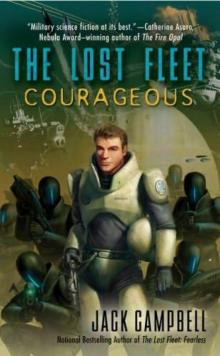 Courageous
Courageous Ad Astra
Ad Astra Destiny of Dragons
Destiny of Dragons Borrowed Time
Borrowed Time Dauntless
Dauntless Blood of Dragons
Blood of Dragons Perilous Shield
Perilous Shield The Assassins of Altis
The Assassins of Altis Vanguard
Vanguard Pirate of the Prophecy
Pirate of the Prophecy Imperfect Sword
Imperfect Sword Boundless
Boundless Triumphant
Triumphant Tarnished Knight
Tarnished Knight Daughter of Dragons
Daughter of Dragons The Servants of the Storm
The Servants of the Storm Steadfast
Steadfast Fate of the Free Lands
Fate of the Free Lands Explorer of the Endless Sea
Explorer of the Endless Sea Triumphant (Genesis Fleet, The)
Triumphant (Genesis Fleet, The) The Lost Fleet: Beyond the Frontier: Steadfast
The Lost Fleet: Beyond the Frontier: Steadfast The Lost Fleet: Beyond the Frontier: Leviathan
The Lost Fleet: Beyond the Frontier: Leviathan The Lost Stars: Imperfect Sword
The Lost Stars: Imperfect Sword Dreadnaught tlfbtf-1
Dreadnaught tlfbtf-1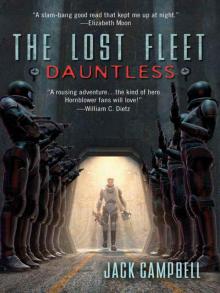 The Lost Fleet: Dauntless
The Lost Fleet: Dauntless Relentless tlf-5
Relentless tlf-5 Lost Fleet 2 - Fearless
Lost Fleet 2 - Fearless Victorious tlf-6
Victorious tlf-6 Dauntless tlf-1
Dauntless tlf-1 The Pirates of Pacta Servanda (Pillars of Reality Book 4)
The Pirates of Pacta Servanda (Pillars of Reality Book 4)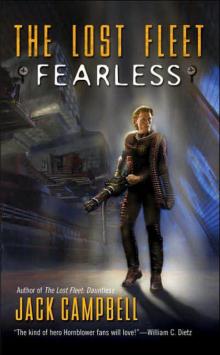 Fearless tlf-2
Fearless tlf-2 The Lost Stars: Perilous Shield tls-2
The Lost Stars: Perilous Shield tls-2 Lost Fleet 5 - Relentless
Lost Fleet 5 - Relentless Lost Fleet 6 - Victorious
Lost Fleet 6 - Victorious Pillars of Reality 5- The Servants of the Storm
Pillars of Reality 5- The Servants of the Storm The Lost Fleet: Beyond the Frontier: Guardian
The Lost Fleet: Beyond the Frontier: Guardian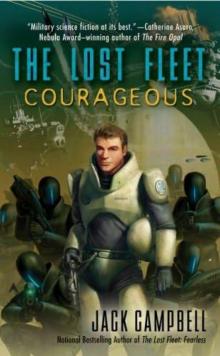 Lost Fleet 3 -Courageous
Lost Fleet 3 -Courageous The Lost Stars: Tarnished Knight
The Lost Stars: Tarnished Knight Beyond the Frontier: Steadfast
Beyond the Frontier: Steadfast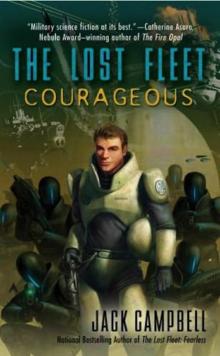 Courageous tlf-3
Courageous tlf-3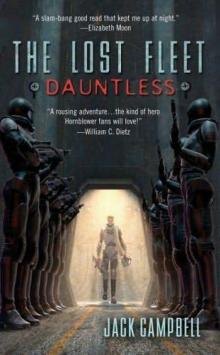 Lost Fleet 1 - Dauntless
Lost Fleet 1 - Dauntless The Lost Stars
The Lost Stars The Lost Fleet: Beyond the Frontier: Dreadnaught
The Lost Fleet: Beyond the Frontier: Dreadnaught The Lost Stars 01-Tarnished Knight
The Lost Stars 01-Tarnished Knight Valiant tlf-4
Valiant tlf-4 The Wrath of the Great Guilds (The Pillars of Reality Book 6)
The Wrath of the Great Guilds (The Pillars of Reality Book 6)